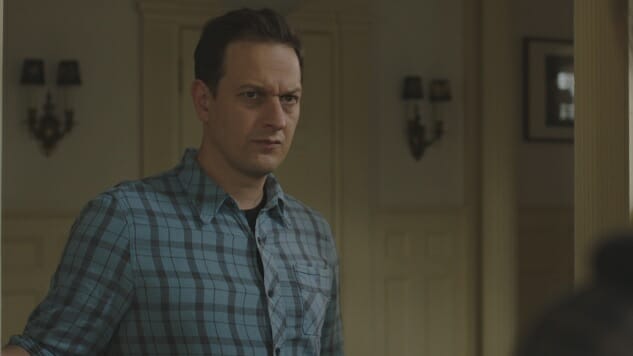The Drowning

Bette Gordon’s The Drowning is a solid craft burger weighed down by one accoutrement too many, either a little too much sauce or an unnecessary dash of spice, depending on what you like on your patties. Gordon has the essentials down: Workmanship, performances, suspense, an element of ambiguity. But she’s directing from the efforts of others, including Pat Barker, author of the original novel the film is based on, and screenwriters Stephen Molton and Frank Pugliese, whose work on the page is over-sufficient and overstuffed all at once. They’re good, and so is the script. You’ll just wish they’d left a couple ingredients out of the finished product before sending it out for commercial consumption.
Talking about those ingredients feels like dirty pool; we don’t get to taste them until later on in The Drowning’s psychological drama. Boiled down to the basics, we’re talking about an indiscretion of the romantic persuasion and a bit of character backstory, but the specifics don’t really matter. What matters is that they don’t pay off. In fact, you could cut them out of the film entirely without drastically altering its genes. That’s because Gordon gives it good bones. The Drowning works in spite of its stumbles, which is, perhaps, faint praise: The stumbles aren’t all that bad, just distracting at best, puzzling at worst. You’ll wonder why Molton and Pugliese thought to include them, why it never occurred to them to cut both elements wholesale, or why Gordon allowed them to trip up her film during production. They’re obvious instances of filler.
C’est la vie. Maybe Gordon has a longer cut in her back pocket, or maybe Molton and Pugliese just wrote a flabby script. None of it stops The Drowning from being enjoyable, fie upon its familiarity. A movie that makes you want to rewatch Primal Fear is hardly a movie worth hating, after all, and The Drowning has a touch more polish than Gregory Hoblit’s 1996 chiller, in which Edward Norton convinces a hotshot Chicago defense attorney of his innocence in the vicious slaying of a local Archbishop. It’s also more grounded, focused on the domestic and marital dynamics of Lauren (Julia Stiles) and Tom Seymour (Josh Charles), a long married Connecticut couple working on their first kid and balancing their separate professional, personal lives. Lauren is a publicist in the art world, and a talented artist in her own right. Tom is a psychiatrist. They’re an average Connecticut couple, in other words, until they stumble upon a man attempting suicide by (surprise!) drowning. Tom leaps into action, and their lives upend.
-

-

-

-

-

-

-

-

-

-

-

-

-

-

-

-

-

-

-

-

-

-

-

-

-

-

-

-

-

-

-

-

-

-

-

-

-

-

-

-








































